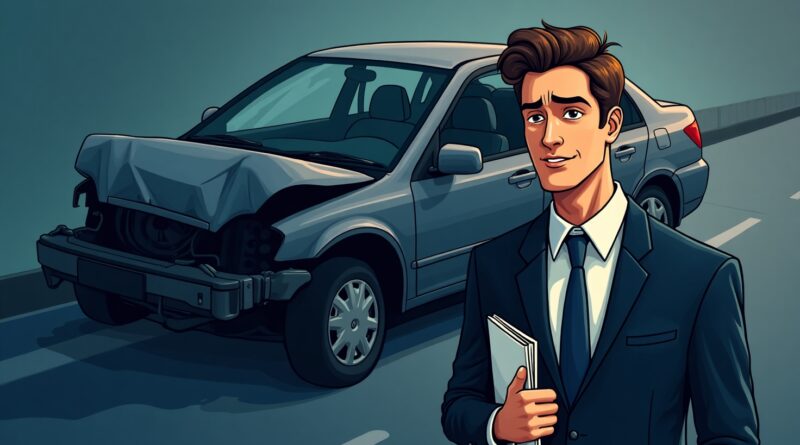Top-Rated Car Accident Attorney: Your Complete Guide to Legal Help After an Auto Crash
Car accidents strike without warning. One second you’re safe, the next, your world is flipped upside‑down: injuries, endless paperwork, insurance adjusters calling you daily, medical bills stacking up. In the chaos, one truth remains: if you’re in an accident that wasn’t your fault—or even if fault is disputed—a car accident attorney is essential.
In this guide, we break down exactly why you need legal help, how a car accident attorney strengthens your case, and how to find the right lawyer for your needs.

1. Why a Car Accident Attorney Is Your Best Ally
- Legal expertise: Car crash injury law is complex. You need someone who knows state statutes, insurance rules, and tort law inside and out.
- Protecting your rights: Insurance adjusters often minimize payouts or deny liability. A savvy attorney counters their tactics.
- Maximizing your compensation: From medical care to future treatments, lost wages to pain and suffering, a smart attorney ensures you’re fully compensated.
A qualified attorney helps streamline the process, letting you focus on healing—not fighting insurance companies.
2. When Should You Contact a Car Accident Attorney?
The moment you’re able, you should speak with an attorney. Situations that absolutely warrant immediate contact:
- Significant injuries (e.g. broken bones, head or spinal injuries, permanent disability).
- Liability disputes and multiple vehicles involved.
- Insurance denial or lowball offers.
- Serious property damage or totaled vehicles.
- Multiple parties or commercial vehicles (such as trucks or ride‑share).
Even if you’re unsure, taking advantage of a free consultation (common with car accident attorneys) is smart—they can explain your options at no cost.
3. Anatomy of a Case: What Your Attorney Actually Does
Investigation & Evidence Gathering
- Police crash reports, Traffic Safety Board data, and video footage (dash cam, surveillance).
- Witness statements, scene photos, medical records, doctor statements.
Assessing Damages
- Immediate medical costs (hospital stays, doctor visits, medicine).
- Future care costs (rehab, surgeries, therapy).
- Lost income (past earnings, lost future earning capacity).
- Non‑economic losses (pain, anxiety, loss of enjoyment).
Insurance Negotiation
- Your attorney drafts demand letters, handles communications with adjusters, and pushes back on denials or undervalued settlement offers.
Trial Representation (if needed)
- If negotiations stall, your attorney prepares pleadings, court filings, expert testimony, and represents you at court. Most car accident cases still settle before trial—but litigation readiness adds leverage.
4. Picking the Right Car Accident Attorney
Here’s how to vet and choose wisely:
✅ Track Record & Experience
Search for successful settlements or verdicts in car accident cases. Attorneys with experience in serious injury or wrongful death suits usually bring greater expertise.
✅ Local Knowledge & State Law Expertise
Different states impose different statutes of limitations (e.g. two years in many states, longer in others). Local rules vary on comparative‑fault, uninsured motorist coverage, etc.
✅ Transparent Fees & Contingency Arrangement
Most car accident attorneys work on contingency—typically around 33%, meaning you pay only if they win. Clarify whether litigation fees, expert witness costs, court filing fees are separate.
✅ Client Reviews & Referrals
Check reputable directories like FindLaw or Avvo, read testimonials, and ask for references.
✅ Communication & Rapport
You need an attorney who returns calls, keeps you updated, and explains legal steps clearly. Strong rapport builds trust.

5. Step‑by‑Step Process After You Hire an Attorney
- Initial meeting (in person or remote): your attorney reviews medical reports, the accident timeline, and explains your rights.
- Document collection & case building: gathering all evidence, medical expenses, income loss, expert opinions.
- Demand letter: your attorney sends a formal demand outlining damages and legal basis for liability.
- Negotiation: multiple rounds or mediation; your attorney works to increase offer value.
- Filing lawsuit (if no acceptable settlement): complaint filed in court, discovery exchanges, depositions.
- Pre‑trial motion arguments or settlement conference: may resolve case without full trial.
- Trial (if necessary): you’re represented at court; attorney cross‑examines defendants and presents arguments.
- Verdict or final settlement: after resolution, attorney deducts fees and fees are paid only if recovery is secured.
6. Case Example: From “Denied” to “Dollars”
Case Summary: Maria, injured in a rear‑end crash in California, faced chronic neck pain and significant medical bills—her insurer offered just $15,000.
Action: She hired a car accident attorney who gathered MRI results, expert neurology testimony, income‑loss documentation, and threat of litigation.
Outcome: A settlement of $95,000—covering medical expenses, lost wages, and psychological distress.
Maria’s case highlights how an attorney turns lowball offers into fair compensation.
7. Common Insurance Tactics and How Attorneys Counter Them
Insurance companies often employ:
- Lowball initial offers, urging you to sign quickly.
- Shifting fault by attributing negligence to you.
- Claims delays, hoping you give up.
- Requesting full records, sometimes to pry into unrelated health history.
Attorneys neutralize these by demanding proper evidence, pushing back professionally, and filing filings if needed—all while speaking the insurance company’s language in negotiations.
8. Statute of Limitations & What Happens If You Wait
Every state sets a deadline—typically 2 or 3 years—to file personal injury claims. Missing this window usually means losing your right to compensation permanently.
Moreover, waiting allows evidence to fade:
- Witness memories dim.
- Injuries worsen or get treated but lose clear causation.
- Records and surveillance may disappear.
So calling a car accident attorney early keeps your legal options strong.
9. Understanding What You Could Recover
Lawyers calculate value based on:
- Medical bills and ongoing care.
- Lost income and decreased earning potential.
- Property damage or replacement value of your vehicle.
- Pain and suffering, emotional impact, loss of consortium.
- Punitive damages (only in rare cases where the other party’s conduct was malicious or grossly negligent).
The goal is to achieve full and fair compensation, not just covering immediate expenses.
10. Car Accident Attorney Fees: What to Expect
Most personal injury attorneys use a contingency fee model:
- Typical fee: 33⅓% of the recovery, plus expenses (mediators, filing fees, expert witness).
- If your case settles before trial, the percentage may be lower.
- If you lose, you pay nothing in attorney fees (though you may still be responsible for court costs if agreed otherwise).
Clarify fee structure before hiring: ask whether the percentage fee is calculated before or after costs, and whether costs come out of the settlement or are reimbursed separately.

11. Why So Few Cases Go to Trial (but Why You Should Still Prepare)
Although about 95% of car accident cases settle out of court, preparedness matters:
- Litigation leverage: Lawyers who prepare to go to trial often negotiate better settlements.
- Insurance companies take prepared counsel more seriously.
- If negotiations fail, you still have a strong case in court.
A strong settlement record often stems from a lawyer’s readiness to litigate if needed.
12. Tips to Strengthen Your Claim Immediately
- Seek medical attention right away, even if injuries seem minor. Document everything.
- Take photos of the accident scene, vehicle damage, injuries.
- Get contact information of witnesses.
- Avoid social media descriptions of the crash—insurance adjusters monitor them.
- Retain records: all bills, work absence proof, medical reports, repair estimates.
These proactive steps significantly aid your attorney’s work.
13. Resources & Backlinks for Further Trust & Guidance
To reinforce your trust in the process and law:
- Visit the National Highway Traffic Safety Administration (NHTSA) for crash statistics, vehicle safety ratings, and tips on accidents post‑crash:
https://www.nhtsa.gov - Search for reputable local attorneys using directories like FindLaw Car Accident Lawyers or Avvo to connect with vetted professionals in your city.
See: FindLaw Car Accident Attorneys and Avvo Car Accident Lawyers.
These resources help you become informed and make smart choices.
14. Frequently Asked Questions (FAQs)
Q: Can I still get compensation if I was partly at fault?
Yes. Most states use comparative negligence, allowing you to recover damages minus your fault percentage. Some states have a modified rule (e.g. at‑fault must be below 50%).
Q: What if the at-fault driver has no insurance?
If you carry uninsured or underinsured motorist coverage, you can pursue compensation through your own policy or file a claim directly against the at-fault party.
Q: How long does a car accident case take?
Most minor injury claims settle within 6–12 months. Serious injury or disputed liability cases may take up to 2 years depending on investigation, negotiation, or litigation complexity.
Q: Is a free consultation really free?
Yes. Most attorneys offer initial consultations at no cost and explain your rights clearly before any agreement.
Q: Do I need to go to court?
Not usually. About 95% of cases settle without trial. But a strong attorney prepares for court as leverage during negotiations.
15. The Final Word: Don’t Go It Alone
Accident aftermath can leave you feeling vulnerable. A skilled car accident attorney ensures you’re not taken advantage of, helps you understand your rights, and fights to recover your losses.
Whether your crash involved minor injuries or serious damage, whether fault is obvious or contested—don’t try to negotiate with insurance companies on your own. Reach out to a trusted car accident attorney and let them build your case while you heal.

